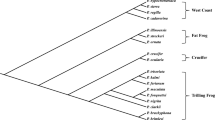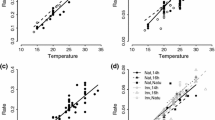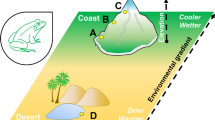Abstract
The West African reed frog Hyperolius nitidulus, mainly known for its extraordinary aestivation behaviour and physiology, is able to vary its reproductive strategy in response to environmental conditions. We found indirect as well as direct evidence for individuals not following the generally assumed one year-one generation life cycle including an extended aestivation phase during the dry season, but leading very short lives for only a part of that rainy season in which the frogs were born. Second-generation frogs (males and females that reproduced in the season in which they were born) were significantly smaller than all other adults and their egg diameter was reduced. As the pattern and amount of rainfall and thus the span of time suitable for reproduction in H. nitidulus varies strongly between years in this savannah region, a flexible reproductive strategy may be highly adaptive for risk spreading. Alternative reproduction strategies probably contribute to the great success of H. nitidulus in terms of the extension of its geographical range and its often very high local abundance.
Similar content being viewed by others
Author information
Authors and Affiliations
Additional information
Electronic Publication
Rights and permissions
About this article
Cite this article
Lampert, K.P., Linsenmair, E.K. Alternative life cycle strategies in the West African reed frog Hyperolius nitidulus: the answer to an unpredictable environment?. Oecologia 130, 364–372 (2002). https://doi.org/10.1007/s00442-001-0821-4
Received:
Accepted:
Published:
Issue Date:
DOI: https://doi.org/10.1007/s00442-001-0821-4




